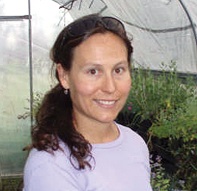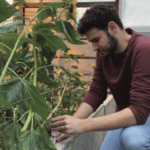
Learning beyond the classroom — Jennifer Browne 2003
Jennifer Browne just graduated from Cornell University’s horticulture program. The chances that she’ll land the job that she wants are high, because Browne has something to offer that sets her apart from other potential entry-level job candidates. It’s experience — six months of it through an internship with North Creek Nursery in Landenberg, Pa.
Jennifer Browne just graduated from Cornell University’s horticulture program. As you read this, she is rock climbing along the beaches of Thailand in warm, summer weather, enjoying her freedom from 4-year brain bondage and contemplating her future. Upon her return, the mountainous West awaits her, and hopefully, a job with a small grower.
The chances that she’ll land the job that she wants are high, because Browne has something to offer that sets her apart from other potential entry-level job candidates. It’s not just the fact that she attended an Ivy League school, is exceedingly bright and hard-working, has excellent communication skills and can speak some Spanish. It’s experience — six months of it through an internship with North Creek Nursery in Landenberg, Pa.
Graduates with real-world experience are hard to find, oftentimes because universities do not require internships for graduation. It’s in these cases that the firm guidance of an academic advisor who believes in the importance of internships is paramount, and that’s just the kind of direction that Browne received through her advisor, Dr. Bill Miller. “If it weren’t for Dr. Miller promoting internships by speaking of them in his class, and even pressing some students, like myself, about how important they are to really learn about the horticulture industry, I don’t think the students would even know about such opportunities,” Browne says.
Working the network
It was one year ago this month that Browne began her internship with North Creek, where she spent 2- to 3-week intervals gaining exposure to all facets of the operation. Propagation, growing, shipping, IPM, research and development, and administration were all part of the real-life curriculum. She took cuttings, sowed seeds and transplanted micro-propagated plants that North Creek bought in from specialists. In the growing department, she maintained the plants by ensuring they were clean of dead leaves, algae, liverwort and moss, and transplanted some species into larger plug trays. She learned that timing is critical when it comes to shipping. She scouted for spider mites, whiteflies, thrips, aphids, Botrytis and other plant maladies. She planted, pruned and weeded the trial gardens, propagated trial species, labeled plants, collected seeds, created ornamental container gardens and wrote plant descriptions for North Creek’s Web site. She also took orders, created bills, organized the customer database, answered customer questions and kept the plant availability list up-to-date. In short, Browne was offered a well-rounded experience that made the most of her eagerness for practical knowledge and her hardworking nature. “She likes to jump in and do things,” says Miller of Browne. “Getting dirty is not a problem. She loves the outdoors, and believes strongly in the linkage of floriculture and nursery production and ornamental horticulture to the environment and our quality of life.”
Browne decided on North Creek because she has aspirations of working for a small operation — she feels that smaller businesses allow interns to learn more because they are able to become acquainted with employees and all aspects of the business more effectively. Dr. Miller played an important role in securing the internship for her; he originally met North Creek’s co-owners, Dale Hendricks and Steve Castorani, on a nursery and garden tour in Germany and The Netherlands in 1996 and has continued his friendship with the nursery through Perennial Plant Association (PPA) events and Hendricks’ participation in Miller’s Cornell class on herbaceous plant materials. Miller says that Hendricks is one of the industry’s best in propagation technique, and with Browne’s particularly strong interest in propagation, he knew that both intern and employer would be a perfect match. After a phone call and a few E-mails, North Creek was prepared to take Browne on as an intern.
North Creek has been working with interns for the past 10 years, even taking on some students from Europe. The nursery offers an internship to help students gain hands-on experience in the industry, as well as to contribute more well-rounded workers to the industry in the future. “[The intern] may decide they chose the wrong career after working here,” says Castorani, “but that’s better than finding out after they choose it as their profession.” North Creek’s name is out in the industry through trade associations such as the International Plant Propagators’ Society (IPPS) and PPA, and through some universities. The majority of those who end up interning with North Creek, however, are sent through the nursery’s network of friends and associates in the industry, such as Bill Miller. It’s a network ç that Browne is now a part of. “[Browne] was able to experience the industry and realize that it is made up not of greenhouses, plants and technology, but of people. One of her emphatic statements was…how she has developed contacts that she can call upon for years into the future,” says Miller.
The experiential difference
Beyond offering a doorway into the vast horticulture industry network, an internship provides an experiential value that cannot be derived from the classroom. “The value of an internship is that you get to learn the everyday ins and outs of a business, which is something that is hard to teach in a classroom. In a classroom, you learn the concepts, ideas and desired practices, but working for a business, you learn the reality of those things, the fundamental qualities of any kind of a company — finances, people management, advertising, etc., and realistically, the fine line between what you want and what you get,” Browne explains. She also believes in the value of an internship as a way to try on a job for size: “Sometimes when you think you could never imagine yourself doing something, you have the opportunity to experience it for a short time and may find that you enjoy it after all.” Or not, in which case the internship still offers a winning situation. “If the internship causes the student to realize he or she is in the wrong field, then, ultimately, we all come out ahead, and the student can retool and head in the right direction,” says Miller.
Regardless of whether or not an internship may mean an entire change in career direction, the most important thing during the experience is to ensure that the student derives the greatest benefit from the internship. While part of that burden is on the intern, the company providing the internship must also play an active role in making it a successful experience. Browne’s advice to growers interested in taking on an intern is that they go out of their way to make sure the intern has the opportunity to see different aspects of everyday business through, for example, sitting in on company discussions, spending a day with the owners, working in the office and learning about advertising and financial matters. “If you open the door to learning about these experiences, the intern will probably be more happy about spending an entire day watering or weeding or getting the 'dirty’ things done,” Browne suggests.
She also views the internship as a potentially beneficial time for the employer to learn something new about their own business. She encourages the grower/owner to ask the intern for insight on anything they may have observed about the business that may improve it. “A lot of times, the intern gets to see, hear and experience things that the head grower might not know about,” Browne says.
Before any of this occurs, however, Castorani believes that both employer and intern need to have an honest discussion to make sure there aren’t any misunderstandings about what the internship entails. “There has to be a clear definition of expectations by both parties,” he advises.
If the student is not deriving from the experience what they had hoped after it has already begun, it is important to maintain an ongoing dialogue to resolve these issues. “Make sure that you are getting out of this experience everything you want and expected and if you are not, speak up!”ç Browne says. “A lot of times, the company might not know what you really want to learn. Also, be prepared and willing to do a lot of things for the company that need to be done. You are not the only one benefiting from this experience. I found that many times, even when I was doing work that I found less than interesting, I was learning a lot.” She also advises that interns keep a journal and write down everything they do and learn each day. “You’d be surprised that you are learning a lot more than you think.”
Although Browne spent all of her summers leading up to her internship working in the horticulture field, she says the six months she spent at North Creek taught her more than she ever learned over those six-plus summers combined because she didn’t spend all of her time working in one position. She learned that she really likes the people who make up the horticulture industry — she likes that they are passionate about plants, friendly and willing to help others. She also learned that “knowing” about horticulture is not the same as “living” horticulture: “It is just as important to be open and good with people, and to be able to manage all different kinds of people to run a successful business,” she reflects. And she learned that being a grower involves a constant state of becoming and evolving through trial and error. “Plants want to grow by themselves — you shouldn’t be afraid to let them die.” Learning, she discovered, does not end with the completion of a 4-year education supplemented by a fantastic internship experience; it is something that will continue throughout her life.







 Video Library
Video Library 




















